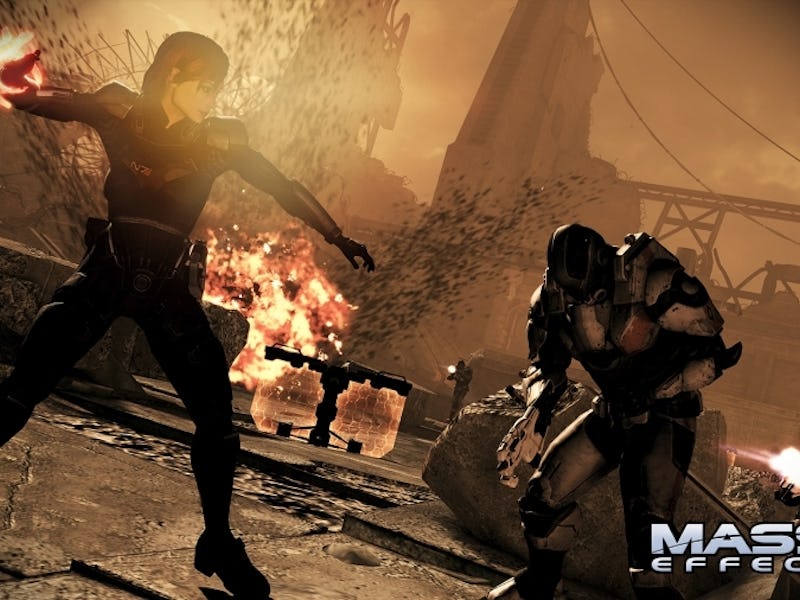'Mass Effect Cerberus': The Real Key To the Network
Cerberus was up to some objectively bad stuff, but the goals behind Cerberus weren't entirely evil. What made Cerberus tick?

Villains who are evil for evil’s sake aren’t interesting. Two-dimensional evil characters are a sure sign of poor writing and underdeveloped characters. The best villains in fiction often have understandable, and sometimes even alarmingly relatable motivations.
Though something of a “necessary evil” in Mass Effect 2, Cerberus is a definitely up to some bad shit.
In Mass Effect’s second installment, Cerberus is framed as an organization dedicated to securing and maintaining the well-being of humans. It’s firmly at odds with the Alliance and, well, pretty much everybody who doesn’t work for it or benefit from its practices. With the Illusive Man in charge, Cerberus develops weapons and technology in the name of “protecting mankind’s interest” but it’s undeniably shady business.
By Mass Effect 3, Cerberus is definitely the enemy, and Shepard and the Normandy crew work to take down its far-reaching operations in the galaxy.
What makes Cerberus so bad, and why does it do what it does?
Members
If Cerberus is evil, how did it get people to join the cause?
It’s important to understand that Cerberus was founded by the Illusive Man upon the notion that humans should have power and a voice in the galaxy, which isn’t a necessarily evil idea. Tensions between alien species and humans has made it difficult to carve a place for mankind on the Citadel. This extends to a degree of difficulty seeking things like protection for humans outside of Alliance space.
In Mass Effect 2, we’re contending with the Reapers, who pose a serious and imminent threat to human colonies. Fear is a powerful motivator and Cerberus is a powerful ally.
A big part of Cerberus’s success is capitalizing on fears, creating threats to those who oppose them, and pointing and leveraging existing threats in the proper directions. Its not unlike a large-scale galactic Frank Underwood a lá House of Cards. The Illusive Man is frighteningly intelligent and knows how to use fear to get what he wants.
Cerberus is good at backing opponents into corners and forcing hands, making it a formidable foe. Let’s just say that not everyone who joins up with Cerberus has done so voluntarily.
Money
Running an evil corporation on a galactic level has got to be expensive, right?
Oh, definitely. And Cerberus is loaded. Having powerful “friends” in the government and military is often pretty lucrative, and the Illusive Man uses that to his advantage. Beyond that, suffice it to say that Cerberus probably would’ve been included in the Mass Effect-verse equivalent of the Panama Papers.
Motivation
The goals of Cerberus are a little vague, but in broad strokes we understand that Cerberus is deeply pro-human and wants to see humans control the galaxy. The Illusive Man’s goal is to give humanity the power that he believes it deserves. He doesn’t just want to peacefully co-exist with alien species — he wants humans to be the most powerful beings in the galaxy (or, given his propensity for grandeur, probably the entire universe).
Fundamentally, it all comes down to a willingness to go take extreme measure to make humanity more powerful — measures like wresting control of weapons, alien species or planets.
The most interesting part of Cerberus as a villainous entity is that its motivations, however singular, are relatively understandable in context. Sure, the Illusive Man goes too far in his quest to ensure the well-being of humanity, but the core of his idea — protecting mankind and giving it a voice among the other species in the galaxy — isn’t inherently evil. It was the execution that was deeply flawed. It came down to a power struggle that the Illusive Man was desperate to win, morality and sanctity of life be damned.
Was the Illusive Man blinded by his desire to see humanity’s status elevated in the galaxy? Or did he act malevolently as he hid behind a seemingly noble cause? Furthermore, did he always have the capacity for darkness, or did his work with Cerberus and the events that led to its founding create darkness within him?
For the most part, it probably depends on whom you ask. And that nuanced complexity built upon an understandable motivation is what makes a compelling antagonist.